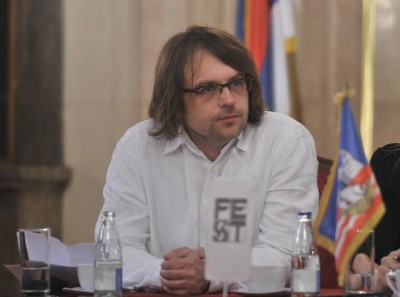-What are the films in the FRONTIERS and THRILLS & KILLS programmes like?
Competition programme FRONTIERS has been a part of FEST since last year. This selection is a dedication to a similar programme which was created by Dušan Makavejev in the beginning of the 1970s, in the early days of FEST. Let me remind you: these are the films which question the frontiers and erase them, which is in line with the slogan of this year’s edition of the festival. Films within this programme are art house titles, which were presented in the selections of important festivals all over the world and which have received certain recognitions. On the other hand, the programme entitled THRILLS & KILLS consists of the films which are more genre-defined and canonic, but in such a way that beneath their surface (i.e. beneath the requirements of the genre) there is a whole other layer of meaning, which is why these films may also be regarded as socio-politically engaged. Films from this selection bring us ultimate film entertainment, suspense, fear, laughter…
-Is there something that connects films in both programmes, a dominating theme or idea?
Yes, there is a single idea which unites these two programmes. It is the idea of a clash between the primordial and contemporary order of things, the latter showing signs of illness. The primordial in these films does not necessarily reveal itself as pure evil, but sometimes it is there as a remedy which aids the contemporary order - clearly in the state of crisis - to come to an end, to be finished. In any case, this primordial order becomes a threat. The authors of these films do not “enlist” the assistance of the primordial because they are enamored of the tradition or past, but they take it as it is, as something outside the history and past, as something before the history, thus questioning the achievements of the civilisation and letting the subconscious prevail over the rational. The authors of these films are probably inspired by the sequence of crises which have shaken the contemporary world (notably in the West), reacting to the constant tension and omnipresent feeling that we are on a brink of a great war.
-Could you single out certain films from the FRONTIERS programme?
There is, for instance, a new film by Lucile Hadžihalilović (regular collaborator of Gaspard Noé) Evolution, which speaks about the fear of the unknown, telling the story from the point of view of boys who spend time on an isolated island. The film III by Pavel Khvaleev speaks about a mysterious disease which puts the mankind into danger, and which can only be treated nontraditionally - namely, by submerging into the sub consciousness of the patient. Demon by the prematurely deceased Polish director Marcin Wrona, is about the evil spirit Dybbuk (from Jewish mythology) which possesses a young man during his wedding ceremony. The micro budget art house horror Ludo by the Indian director commonly known as Q, brings forth the story about a group of teenagers who become part of a deadly game, led by a couple of spirits during one night in a shopping mall. These are all characteristic examples of the prevalent idea of this year’s FRONTIERS programme, which is, as I have already mentioned, the contemporary order being threatened by the irrational, primordial.
-How about the THRILLS & KILLS programme?
From the programme THRILLS & KILLS I would like to single out the hit film presented at the Toronto International Film Festival Midnight Madness selection, Turkish horror Baskin. This exotic horror follows a group of policemen who, circumstantially, become part (victims) of an ancient ritual taking place in a desolate house. Actually the film speaks about the current political topic in Turkey of today which is the clash of Ataturk’s and Ottoman heritage. Invitation, a film by Karyn Kusama, is an excellent chamber thriller, situated in a house in the suburb of an American town where a group of middle-aged people become victims of a peculiar sect which has found an interesting way to face death. Highly productive, cult Japanese author Takashi Miike, who is especially known for his ability to infuse ossified genre forms with fresh energy, thus revitalizing them and extending their lifespan, comes with his new film Yakuza Apocalypse. It gives an interesting take on the traditional yakuza films by turning the mobsters into - vampires.
-Is there anything different in the concept of the THRILLS & KILLS programme, compared to the previous year? Are there any Midnight screenings?
Compared to the last year’s selection, THRILLS & KILLS has been enriched with two films from the region. These are the SF horror The Rift by Serbian director Dejan Zečević (from the producers Marko Jocić and Milan Todorović), a Serbian-Korean-Slovenian coproduction, as well as Slovene pastoral horror Idyll by Tomaž Gorkić, recipient of the Vesna award for the best film in Slovenia last year. Several titles from the THRILLS & KILLS programme will be shown at Midnight screenings.
-Are there any micro-budget Serbian films at this year’s FEST?
Yes, FEST will feature its MICROWAVE selection for the second consecutive year. This programme testifies about the firm intention of Serbian authors to make films not relying on official i.e. state funded financial support. From this selection I would like to single out two premieres: firstly Signature Work (Tunel ispod Terazija) by Dejan Vlaisavljević, and art house thriller, a film-essay, dedicated to the film noir genre (more specifically, to the film Scarlet Street by Fritz Lang from 1945). A true example of the “garage film” which we promoted last year… The second premiere which I would like to mention is the film Open Wound (Otvorena), by young director Momir Milošević. It is a drama with elements of horror, in which the refusal to fully rationalise and accept the relationship between two principal female protagonists results in the creation of a monster by the sub consciousness.




![Download [ 155.11KB]](/upload/images/box_download.png)









